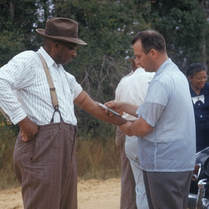 In 1932, the Public Health Service, working with the Tuskegee Institute, began a study to record the natural history of syphilis in Macon County, Alabama. It was called the “Tuskegee Study of Untreated Syphilis in the Negro Male.” The study initially involved 600 black men. Participants were coerced into taking part in the study in exchange for free medical exams, free meals, and burial insurance for the families. Researchers told the men they were being treated for “bad blood,” a local term used to describe several ailments. In truth, they did not receive any treatment needed to cure their illness even when penicillin became available in 1947. Researchers even went so far as to convince local physicians in Macon County not to treat the participants with penicillin. In order to track the disease’s full progression, researchers provided no effective care even as the men died, went blind or insane, or experienced other severe health problems due to their untreated syphilis. They also did not advise the men on protective sexual activity to reduce the spread of the infection to partners. Although originally projected to last 6 months, the study actually went on for 40 years. Reparations in the amount of $10 million were disbursed to families affected in 1973, but as a result of the experiment many African Americans developed a lingering, deep mistrust of public health officials.
1 Comment
Manuel Franco
10/15/2023 02:52:49 am
I just want to say Thank You to everyone who supported me through the years. My name is Manuel Franco, New Berlin, Wisconsin. My story of how I won the Powerball lottery of $768.4M is a bit of a tale. I have been playing Powerball tickets for 6 years now since I turned 18. I bought my first ticket on my 18 birthday. I was feeling very lucky that day because I had contacted Dr. Odunga Michael to help me with the winning Powerball numbers. I really had that great great feeling that I looked at the camera wanting to wink at it. I only did a tiny part of it and trusted him. He gave me the numbers after I played a couple other tickets along with it for $10. I checked my ticket after the winnings came online and saw the numbers were correct including the Power play. I screamed for about 10 minutes because it felt like a dream. I had won $768.4M. You can check my winning testimony with the lottery officials just with my name search. Thank you Dr Odunga. Well, his email is [email protected] and you can also call or Whats-app him at +2348167159012 so you guys can contact him
Reply
Leave a Reply. |
For frequent updates, visit the Facebook page of Austin NAACP President Nelson Linder!
Archives
July 2024
|


 RSS Feed
RSS Feed